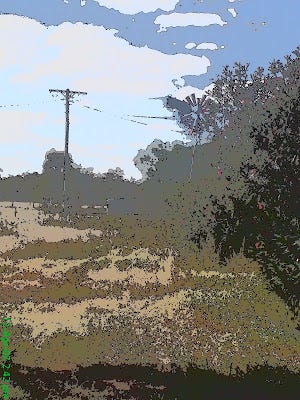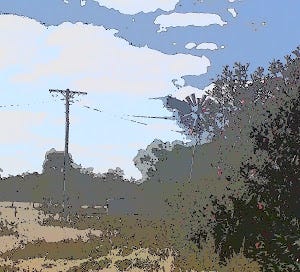
This is the view of my backyard in Tambar, and this is the story as it continued:
"The children cowered in the park. Conversations stopped. Television shows were viewed in gaps made by thunder. I wish I was on it right now, Anna whinged for the umpteenth time, putting his own discontent into words for him to reject. He just wanted to get to work. Being late every morning of his life made him conspicuous, which was the last thing he needed right now.
"Mornings were not Anna's best time, and this morning was no exception. She was going to INdia the next day, having scammed a trip he couldn't afford for himself, forcing him to be the bigger person. By all means go, have a good time, I've been there several times, I'll look after the kids. Enjoy yourself. After all, you were pregnant for two years in a row, he said, c-oopting her argument. Take the opportunity. We can't hold each other back just because we had children.
"The truth was, he had forgotten what it was like to be on his own and wanted to remember, to think his own thoughts. There were floods of affection, of feeling wanted, settling into an identity. Becoming a man, a husband, a father. And now the anger."
THE BIGGER STORY:
Belfast Telegraph:
Troops told to shoot rioters as death toll mounts in Karachi
Monday, May 14, 2007
By Rachel Shields
Pakistan's government authorised paramilitary troops to shoot anyone involved in serious violence yesterday as the crisis triggered by the dismissal of Pakistan's top judge took an ominous and bloody turn.
Seven more people were killed yesterday, bringing the death toll from a weekend of violence to 41. President Pervez Musharraf suspended the judge, Iftikhar Muhammad Chaudhry, in March but he has since become a focus for protesters trying to end military rule.
The BBC's correspondent in Karachi said five of those killed on Sunday were kidnapped and executed. One of them was a worker from the pro-Musharraf MQM party. Two more were reportedly tortured and then shot in the head.
Funeral processions were accompanied by gun battles, ambulance crews were attacked, and at least two people died in clashes between traditional rivals in Karachi.
Fighting between the Pashtuns, and Urdu-speakers linked to the MQM raised the spectre of a return to ethnic bloodshed in a port city of 15 million people that serves as the hub of Pakistan's economy.
The violence marked a serious escalation in a crisis that began with President Musharraf ousting the head of the supreme court on 9 March, and which has hardened opposition to plans for the general, a key US ally, to extend his rule.



